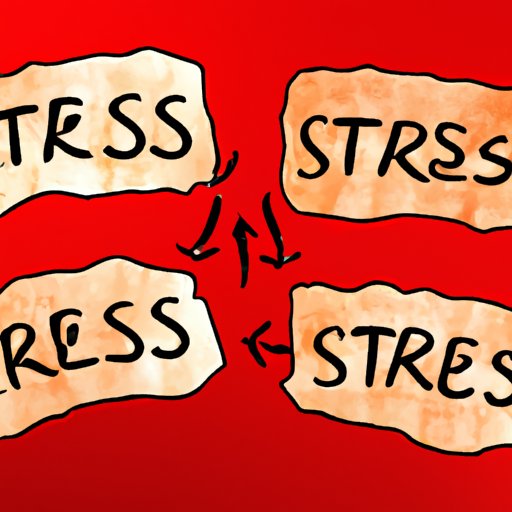
I. Introduction
Ulcers are a common form of digestive disorder that affects millions of people worldwide. For years, it was believed that stress was the primary cause of ulcers. However, recent scientific studies have debunked this myth, revealing that while stress may not directly cause ulcers, it can certainly contribute to their development. In this article, we’ll take a closer look at the connection between stress and ulcers, separating fact from fiction, and exploring the links between the two.
II. The Link Between Stress and Ulcers: Separating Myth from Fact
It is a common belief that stress is the primary cause of ulcers. However, research has shown that this is not entirely true. While stress may not be the sole cause of ulcers, it can certainly contribute to their development. Stress creates an environment where the digestive system is unable to function properly, leading to a range of digestive disorders including ulcers. So while the idea that stress causes ulcers is a myth, it is not entirely inaccurate.
III. Do You Have an Ulcer? Stress Could Be a Key Factor
Stress can directly or indirectly contribute to the development of ulcers. When we experience stress, the body responds by producing a hormone called cortisol. This hormone can weaken the immune system and decrease the production of the mucus that protects the stomach lining from digestive acids. Chronic stress can also result in decreased blood flow to the digestive system, leading to imbalances in digestive acids and increasing the risk of ulcer formation. Stressful situations can exacerbate existing ulcers, leading to an increase in symptoms such as pain, nausea, and vomiting.
IV. Stomach Ulcers and the Role of Chronic Stress
Stomach ulcers, also known as gastric ulcers, are open sores that develop on the lining of the stomach. They are typically caused by a bacterium called Helicobacter pylori, but can also be the result of long-term use of non-steroidal anti-inflammatory drugs (NSAIDs). Chronic stress can exacerbate the symptoms of stomach ulcers, leading to increased discomfort, pain, and inflammation of the stomach lining. Studies have also shown that stress can increase the risk of developing H. pylori infections, which can lead to stomach ulcers.
V. The Science Behind How Stress Can Cause Ulcers
Stress can cause ulcers in several ways. First, it increases the production of stomach acid, which can erode the lining of the stomach, leading to ulcer formation. Second, the hormone cortisol, which is released in response to stress, can weaken the immune system, leaving the stomach lining more vulnerable to the bacteria that cause ulcers. Third, chronic stress can lead to a decrease in blood flow to the digestive system, which can weaken the stomach lining and increase the risk of ulcer formation.
VI. Understanding the Connection Between Stress and Ulcers
Psychological factors such as anxiety, depression, and trauma can contribute to the development of stress-related ulcers. These mental health conditions can lead to chronic stress, which can interfere with the proper functioning of the digestive system and lead to imbalances in digestive fluids. This can weaken the stomach lining, increasing the risk of ulcer formation. In addition, those with anxiety and depression may also engage in unhealthy behaviors such as smoking, drinking alcohol, and overeating, which can contribute to the development of ulcers.
VII. Stress-Related Ulcers: Causes, Symptoms, and Treatment
Stress-related ulcers share many symptoms with other types of ulcers, including pain in the upper abdominal region, nausea, vomiting, and bloating. Treatment options include medication to lower stomach acid production, antibiotics to treat underlying bacterial infections, and changes in lifestyle habits to reduce stress. It is essential to maintain healthy eating habits, exercise regularly, and practice techniques such as meditation and mindfulness to reduce stress levels.
VIII. Breaking Down the Relationship Between Stress and Digestive Disorders, Including Ulcers
Stress can affect the digestive system in many ways. In addition to contributing to the development of ulcers, stress can also lead to other digestive disorders, including irritable bowel syndrome (IBS), Crohn’s disease, and colitis. When the digestive system is under stress, it can cause imbalances in digestive acids, leading to inflammation, pain, and other symptoms.
IX. Conclusion
While stress may not directly cause ulcers, it certainly plays a significant role in their development. By understanding the link between stress and ulcers, we can take steps to reduce stress levels and prevent the development or worsening of digestive disorders such as ulcers. Practicing self-care techniques, including exercise, proper nutrition, and mindfulness practices such as meditation, can help reduce stress levels and protect the digestive system from harm.





